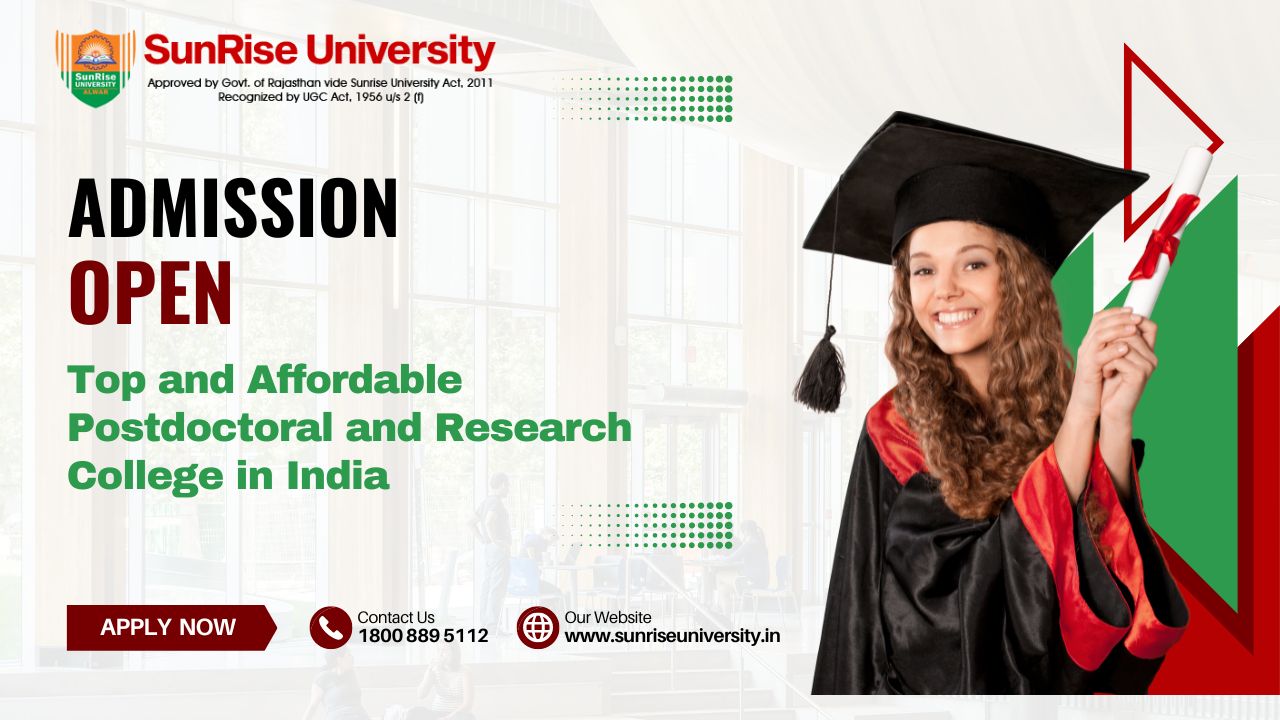Top and Affordable Postdoctoral and Research College in India
About Sunrise University
A postdoctoral position refers to a temporary research position In The Top University Of Delhi And Haryana that individuals typically take after completing their doctoral studies (Ph.D. or equivalent). This period, known as a postdoc, allows researchers to gain additional research experience, further develop their skills, and contribute to ongoing research projects. Postdoctoral researchers work under the guidance of a principal investigator or a mentor in a research institution, university, or industry setting.
Here are some key points about postdoctoral positions:
-
Duration: Postdoctoral positions are usually temporary, lasting from one to several years. The duration depends on the specific project or funding available.
-
Research Focus: Postdocs engage in advanced research within their field of expertise. The goal is to deepen their understanding of a specific topic, publish research papers, and sometimes contribute to grant applications.
-
Professional Development: Postdocs use this time to enhance their research skills, learn new techniques, and build a network within the scientific community. They may also have opportunities to mentor graduate students and collaborate with other researchers.
-
Funding: Postdoctoral positions are often funded through research grants, fellowships, or institutional funds. The availability of funding can influence the number of postdoctoral positions available in a particular field.
-
Career Path: While some postdocs pursue tenure-track academic positions, others transition to careers in industry, government, or non-profit sectors. The experience gained during a postdoc is valuable for career development.
As for research, it is a systematic investigation aimed at discovering new knowledge, interpreting facts, or revising existing theories. Research can be conducted in various fields, including science, engineering, humanities, social sciences, and more. The research process typically involves defining a problem, reviewing existing literature, designing and conducting experiments or studies, analyzing data, and drawing conclusions.
Researchers, including postdoctoral researchers, contribute to the growth of knowledge in their respective fields by conducting innovative and rigorous research. The results of research are often disseminated through publications in academic journals, presentations at conferences, and other forms of communication.
Admission process of Postdoctoral and Research
The admission process for postdoctoral positions and research opportunities varies depending on the Best University Of India, country, and field of study. Here are general steps that are commonly involved in the admission process for postdoctoral positions and research opportunities:
-
Identification of Opportunities:
-
Identify potential postdoctoral positions and research groups that align with your research interests and expertise.
-
Explore job postings on university websites, research institutions, or academic job boards.
-
Contacting Potential Mentors:
-
Reach out to potential mentors or principal investigators (PIs) expressing your interest in their research.
-
Provide a cover letter, curriculum vitae (CV), and possibly reference letters.
-
Some positions may require you to submit a formal application through the institution's online system or by email.
-
Application materials typically include a cover letter, CV, research statement, and reference letters.
-
If shortlisted, you may be invited for an interview, which could be in-person, by phone, or via video conferencing.
-
Be prepared to discuss your research background, interests, and potential contributions to the research group.
-
Negotiation and Acceptance:
-
Once selected, negotiate terms such as salary, project details, and duration.
-
Upon agreement, you will receive a formal offer, and the hiring process will commence.
-
Identifying Funding Opportunities:
-
Identify research funding opportunities, grants, fellowships, or projects that align with your research goals.
-
Explore funding agencies, research institutions, and industry-sponsored research programs.
-
Prepare and submit a research proposal outlining your research objectives, methodology, and expected outcomes.
-
Follow the specific guidelines provided by the funding agency or institution.
-
Your research proposal may undergo a peer-review process where experts in the field evaluate its merit and feasibility.
-
The review process may include interviews or presentations defending your proposal.
-
If successful, you will receive a notification of the award, including details about the funding amount, duration, and any specific conditions.
-
Upon receiving funding, commence the research project according to the proposed timeline and milestones.
Subject And Syllabus For Postdoctoral And Research
The subject and syllabus for postdoctoral research positions in Top and Affordable University of India are highly specific and dependent on the field of study, the research institution, and the nature of the research project. Unlike formal academic programs with structured syllabi, postdoctoral research is typically focused on a particular research question or project. Here are general guidelines based on common fields:
Science and Engineering:
-
Physics, Chemistry, Biology, Environmental Science, Materials Science, etc.
-
Advanced materials development
-
Molecular biology and genetics
-
Quantum computing and physics
-
Environmental impact assessments
-
Nanotechnology research
Social Sciences and Humanities:
-
Sociology, Psychology, Economics, Political Science, Literature, etc.
-
Social behavior and psychology studies
-
Economic policy analysis
-
Political systems and governance
-
Literature and cultural studies
-
Medicine, Public Health, Biomedical Sciences, etc.
-
Clinical trials and medical interventions
-
Epidemiological studies
-
Drug development and pharmacology
-
Healthcare policy and management
Computer Science and Information Technology:
-
Computer Science, Information Technology, Artificial Intelligence, etc.
-
Machine learning and deep learning algorithms
-
Cybersecurity and network protocols
-
Human-Computer Interaction
-
Data science and analytics
-
Business Administration, Management, Finance, etc.
-
Corporate governance and strategy
-
Financial market analysis
-
Organizational behavior and leadership
-
Marketing research and consumer behavior
Environmental and Earth Sciences:
-
Geology, Environmental Science, Geography, etc.
-
Climate change and its impacts
-
Geological surveys and exploration
-
Sustainable resource management
-
Remote sensing and GIS applications






